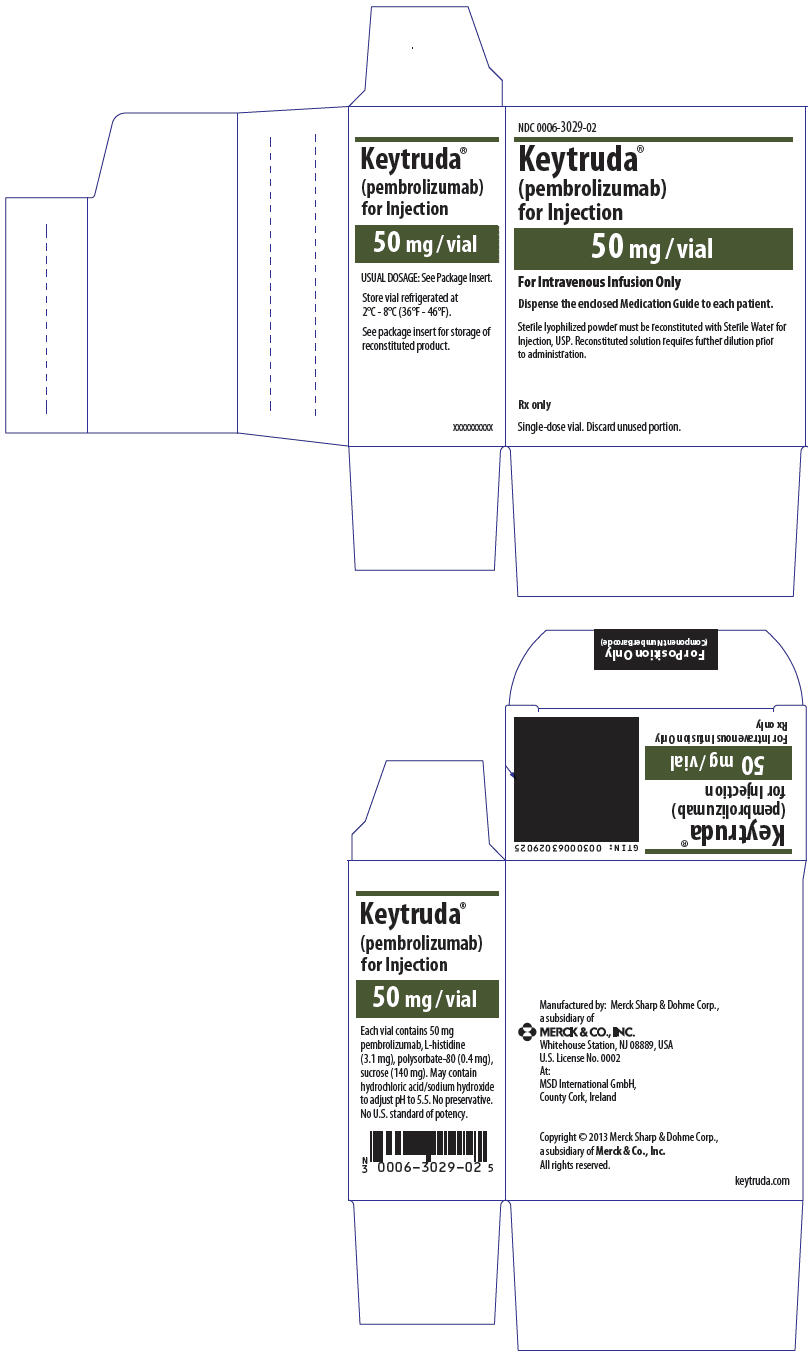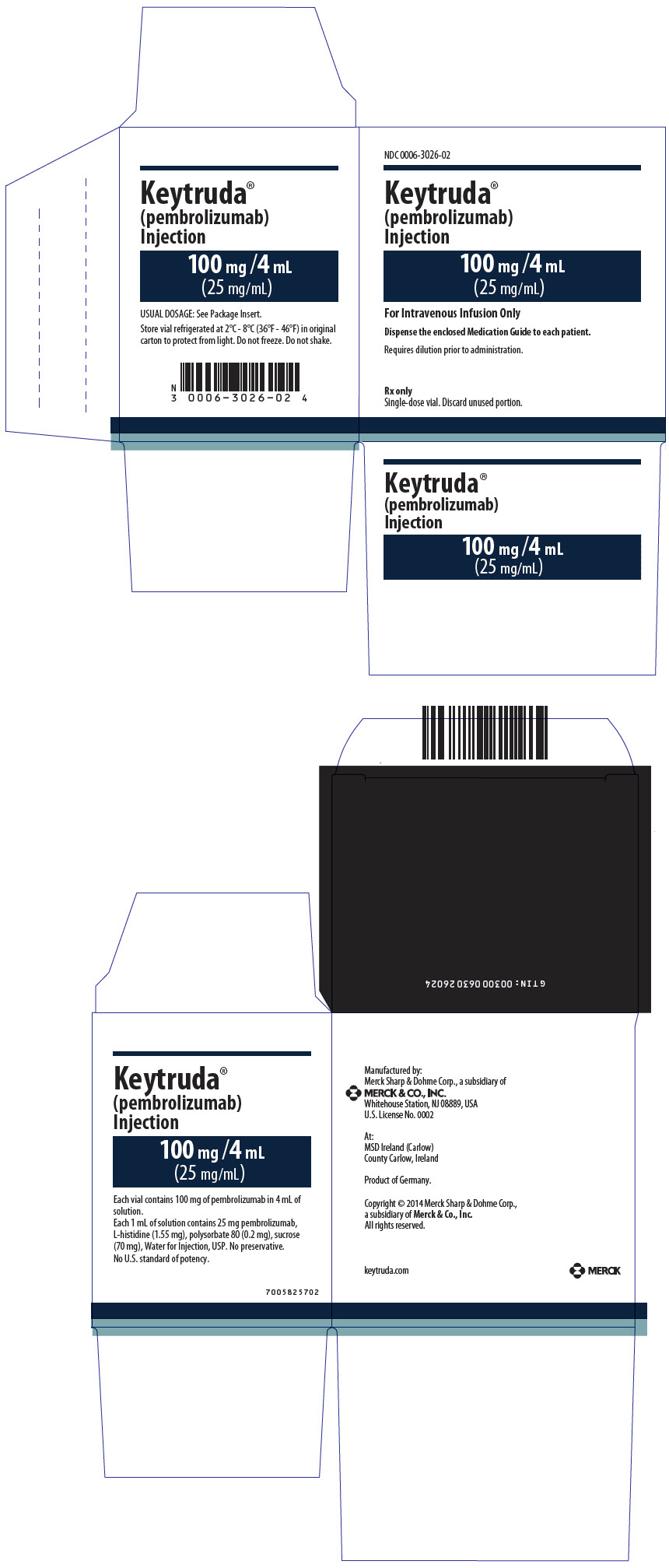Pembrolizumab
Generic name: pembrolizumab
Brand name: Keytruda
Dosage form: intravenous (infusion) injection
Drug class: Anti-PD-1 monoclonal antibodies
Medically reviewed by A Ras MD.
What is pembrolizumab used for?
Pembrolizumab is a prescription medicine that is used to treat cancer.
Description
Pembrolizumab is a programmed death receptor-1 (PD 1)-blocking antibody. Pembrolizumab is a humanized monoclonal IgG4 kappa antibody with an approximate molecular weight of 149 kDa. Pembrolizumab is produced in recombinant Chinese hamster ovary (CHO) cells.
KEYTRUDA (pembrolizumab) injection is a sterile, preservative-free, clear to slightly opalescent, colorless to slightly yellow solution for intravenous use. Each vial contains 100 mg of pembrolizumab in 4 mL of solution. Each 1 mL of solution contains 25 mg of pembrolizumab and is formulated in: L-histidine (1.55 mg), polysorbate 80 (0.2 mg), sucrose (70 mg), and Water for Injection, USP.
Mechanism of Action
Binding of the PD-1 ligands, PD-L1 and PD-L2, to the PD-1 receptor found on T cells, inhibits T cell proliferation and cytokine production. Upregulation of PD-1 ligands occurs in some tumors and signaling through this pathway can contribute to inhibition of active T-cell immune surveillance of tumors. Pembrolizumab is a monoclonal antibody that binds to the PD-1 receptor and blocks its interaction with PD-L1 and PD-L2, releasing PD-1 pathway-mediated inhibition of the immune response, including the anti-tumor immune response. In syngeneic mouse tumor models, blocking PD-1 activity resulted in decreased tumor growth.
Before taking pembrolizumab, tell your doctor:
- If you are allergic to pembrolizumab; any part of this medicine; or any other drugs, foods, or substances. Tell your doctor about the allergy and what signs you had.
- If you are taking any of these drugs: Lenalidomide, pomalidomide, or thalidomide.
- If you are breast-feeding. Do not breast-feed while you take pembrolizumab or for 4 months after your last dose.
This is not a list of all drugs or health problems that interact with pembrolizumab.
Tell your doctor and pharmacist about all of your drugs (prescription or OTC, natural products, vitamins) and health problems. You must check to make sure that it is safe for you to take pembrolizumab with all of your drugs and health problems. Do not start, stop, or change the dose of any drug without checking with your doctor.
What are some things I need to know or do while I take pembrolizumab?
For all uses of pembrolizumab:
- Tell all of your health care providers that you take pembrolizumab. This includes your doctors, nurses, pharmacists, and dentists.
- This medicine may cause very bad side effects. Sometimes these have been life-threatening or deadly. These may happen in the lungs, bowels, liver, kidney, pituitary gland, thyroid gland, or other parts of the body. If you have questions, talk with the doctor.
- Tell your doctor if you have signs of high blood sugar like confusion, feeling sleepy, more thirst, more hungry, passing urine more often, flushing, fast breathing, or breath that smells like fruit.
- Call your doctor right away if you have signs of liver problems like dark urine, feeling tired, not hungry, upset stomach or stomach pain, light-colored stools, throwing up, or yellow skin or eyes.
- Call your doctor right away if you have signs of kidney problems like not able to pass urine; change in how much urine is passed; bloody, brown, or foamy urine; shortness of breath or cough; or puffy or swollen face, feet, or hands.
- Call your doctor right away if you have signs of thyroid, pituitary, or adrenal gland problems. Some signs may be change in mood or the way you act, change in weight, constipation, deeper voice, dizziness, fainting, feeling cold, feeling very tired, hair loss, headache that lasts or is very bad, or lowered interest in sex.
- Call your doctor right away if you have signs of a brain problem like change in balance, feeling confused, fever, memory problems, muscle weakness, seizures, stiff neck, or very upset stomach or throwing up.
- Infusion reactions have happened with pembrolizumab. Sometimes, these could be very bad or life-threatening. Talk with the doctor.
- A very bad skin reaction (Stevens-Johnson syndrome/toxic epidermal necrolysis) may happen. It can cause very bad health problems that may not go away, and sometimes death. Get medical help right away if you have signs like red, swollen, blistered, or peeling skin (with or without fever); red or irritated eyes; or sores in your mouth, throat, nose, or eyes.
- If you have had an organ transplant, talk with your doctor. This medicine may raise the chance of organ transplant rejection.
- This medicine may cause harm to an unborn baby. A pregnancy test will be done before you start pembrolizumab to show that you are NOT pregnant.
- Use birth control to prevent pregnancy during treatment and for some time after your last dose. Talk with your doctor to see how long to use birth control after you stop pembrolizumab.
For lymphoma:
- If you are having or have had a stem cell transplant with stem cells from someone else (allogeneic), talk with your doctor. Some problems with these types of stem cell transplants have happened in people who have had pembrolizumab. These problems can be very bad and can lead to death.
How is pembrolizumab best taken?
Use pembrolizumab as ordered by your doctor. Read all information given to you. Follow all instructions closely.
- It is given as an infusion into a vein over a period of time.
- Have blood work checked as you have been told by the doctor. Talk with the doctor.
- If you have high blood sugar (diabetes), talk with your doctor. This medicine may raise blood sugar.
- Check your blood sugar as you have been told by your doctor.
What do I do if I miss a dose?
- Call your doctor to find out what to do.
What are the side effects of pembrolizumab that I need to call my doctor about immediately?
WARNING/CAUTION: Even though it may be rare, some people may have very bad and sometimes deadly side effects when taking a drug. Tell your doctor or get medical help right away if you have any of the following signs or symptoms that may be related to a very bad side effect:
For all uses of pembrolizumab:
- Signs of an allergic reaction, like rash; hives; itching; red, swollen, blistered, or peeling skin with or without fever; wheezing; tightness in the chest or throat; trouble breathing, swallowing, or talking; unusual hoarseness; or swelling of the mouth, face, lips, tongue, or throat.
- Signs of bowel problems like black, tarry, or bloody stools; fever; mucus in the stools; throwing up blood or throw up that looks like coffee grounds; or very bad stomach pain, constipation, or diarrhea.
- Signs of electrolyte problems like mood changes, confusion, muscle pain or weakness, a heartbeat that does not feel normal, seizures, not hungry, or very bad upset stomach or throwing up.
- Signs of lung or breathing problems like shortness of breath or other trouble breathing, cough, or fever.
- Chest pain or pressure or a fast heartbeat.
- A heartbeat that does not feel normal.
- Any unexplained bruising or bleeding.
- Change in eyesight, eye pain, or very bad eye irritation.
- Swollen gland.
- Feeling very tired or weak.
- Dizziness or passing out.
- Fever or chills.
- Flushing.
- Sweating a lot.
- A burning, numbness, or tingling feeling that is not normal.
- Not able to move.
- White patches on the skin.
Bladder cancer treatment:
- Signs of a urinary tract infection (UTI) like blood in the urine, burning or pain when passing urine, feeling the need to pass urine often or right away, fever, lower stomach pain, or pelvic pain.
What are some other side effects of pembrolizumab?
All drugs may cause side effects. However, many people have no side effects or only have minor side effects. Call your doctor or get medical help if any of these side effects or any other side effects bother you or do not go away:
- Feeling tired or weak.
- Back, bone, joint, or muscle pain.
- Not hungry.
- Stomach pain.
- Headache.
- Weight loss.
- Hair loss.
- Change in taste.
- Trouble sleeping.
- Signs of a common cold.
- Flu-like signs.
- Constipation, diarrhea, throwing up, and upset stomach are common with pembrolizumab. If these happen, talk with your doctor about ways to lower these side effects. Call your doctor right away if any of these effects bother you, do not go away, or get very bad.
These are not all of the side effects that may occur. If you have questions about side effects, call your doctor. Call your doctor for medical advice about side effects.
You may report side effects to the FDA at 1-800-332-1088. You may also report side effects at https://www.fda.gov/medwatch.
If overdose is suspected:
If you think there has been an overdose, call your poison control center or get medical care right away. Be ready to tell or show what was taken, how much, and when it happened.
How do I store and/or throw out pembrolizumab?
- If you need to store pembrolizumab at home, talk with your doctor, nurse, or pharmacist about how to store it.
Label
PRINCIPAL DISPLAY PANEL – 50 MG VIAL CARTON
- NDC 0006-3029-02
- Keytruda®
(pembrolizumab)
for Injection - 50 mg / vial
- For Intravenous Infusion Only
- Dispense the enclosed Medication Guide to each patient.
- Sterile lyophilized powder must be reconstituted with Sterile Water for
Injection, USP. Reconstituted solution requires further dilution prior
to administration.
Rx only
Single-dose vial. Discard unused portion.

PRINCIPAL DISPLAY PANEL – 100 MG/4 ML VIAL CARTON
- NDC 0006-3026-02
- Keytruda®
(pembrolizumab)
Injection - 100 mg/4 mL
(25 mg/mL) - For Intravenous Infusion Only
- Dispense the enclosed Medication Guide to each patient.
- Requires dilution prior to administration.
- Rx only
Single-dose vial. Discard unused portion.

SRC: NLM .